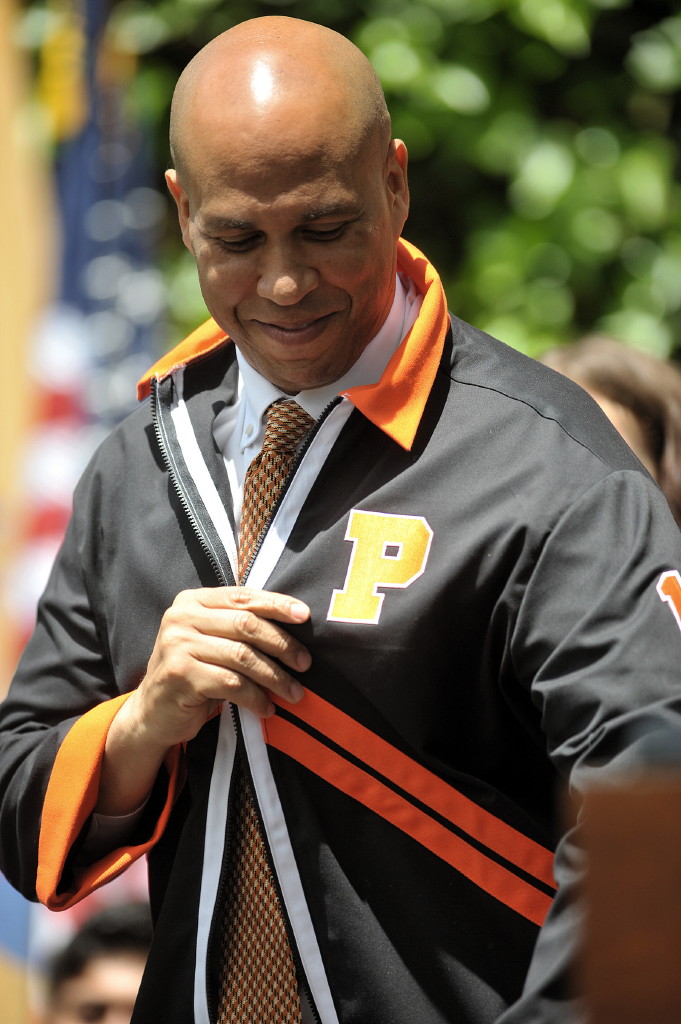U.S. Sen. Cory Booker (D-NJ) on June 4 told graduating seniors at Princeton University to give of themselves and not measure success by academic achievement, in a speech that wove in anecdotes of people who have influenced him.
“Life’s not about the degrees you get, it’s about the service you give,” he said as the keynote speaker during class day, a Princeton tradition dating to 1856. “That in so many ways, the opposite of justice is not injustice, it is inaction, it is apathy, it is silence.
“Never forget that the biggest thing you can do, on most every day, is often just a small act of kindness, decency, love and caring,” he said to the class of 2018, which made him one of its honorary members.
He told graduates of the nation’s top ranked university, according to U.S. News and World Report, they were “powerful.”
“Power is not how physically strong you are, it’s how morally consistent you are,” he said. “Power does not come from your title. It comes from you telling your truth every single day in your smallest of actions, what you decide to do with the dollars you spend, how you notice the dignity of the person on the street, how you give one act of kindness more than you thought.”
Booker spoke to an audience of seniors and other guests sitting behind historic Nassau Hall, the 18th century building covered with ivy and adorned with a 2018 banner serving as his backdrop. As the first black senator ever elected from New Jersey, the Democrat gave a speech heavy on personal biography that delved into race.
He shared how his father, Cary, grew up poor in North Carolina and later experienced housing discrimination when he and his wife tried to buy a house in the northern suburbs of New Jersey in 1969.
“They were literally steered away from white communities,” he said.
Booker, who would go on to graduate from Stanford, Oxford and Yale universities, recalled what his father once said about all of his son’s academic accomplishments.
“My dad’s like, ‘Come on, boy, you’ve got more degrees than the month of July, but you ain’t hot,’ ” he said.
His father, however, would not see him join the Senate. Cary Booker died six days before the special election in 2013 that sent his son to Washington, D.C.
“Now, death can end a life, but it can’t end a love,” the senator said. “I missed him teasing me, I missed him making fun of me, I missed him reminding me to keep my feet on the ground, not to let my head to get too big.”
In terms of his political resume, Booker is a former Newark councilman who later was elected mayor of the largest city in the state before he ran for the Senate in 2013. He won a special election that year to fill the term of the late Frank Lautenberg and then had to run again in 2014 for the six-year-term he is serving.
Booker said he keeps a map of Newark’s Central Ward, a place he first represented as a councilman and in which he still lives, on a wall in his Senate office. He said “those were the folks that pushed me into politics, believed in me (and) took a risk on me.”
Before being sworn in to the Senate, he said he and his mother visited U.S. Rep. John Lewis, a Georgia Democrat who was a civil rights leader.
“This is a hero to me, a giant, and I’m sitting in his office and the man is so humble,” Booker said of Lewis.
He recalled how Lewis expressed how much it meant to him to see Booker become the fourth popularly elected black senator. He told the graduates of the example he saw in Lewis’ life.
“He teaches that patriotism is love of country and you cannot love your country unless you love your countrymen and women,” Booker said. “You love them all. And he shows me that you can’t lead the people if you don’t love the people.”
Booker has been the subject of media speculation about him possibly running for president in 2020, the same year in which he has to defend his senate seat. He did not address the issue during his speech at Princeton, although one Class Day student speaker made a light-hearted reference about that topic and even jokingly asked him if he would make an announcement.
Booker, 49, was born in Washington, D.C., but he said he had a lot of “Jersey pride” for the state he grew up in.
“I cannot tell you how many fights I’ve had on the Senate floor over Jersey respect,” he said. “I have so much Jersey pride, if you cut me, I’d bleed Jersey.”

